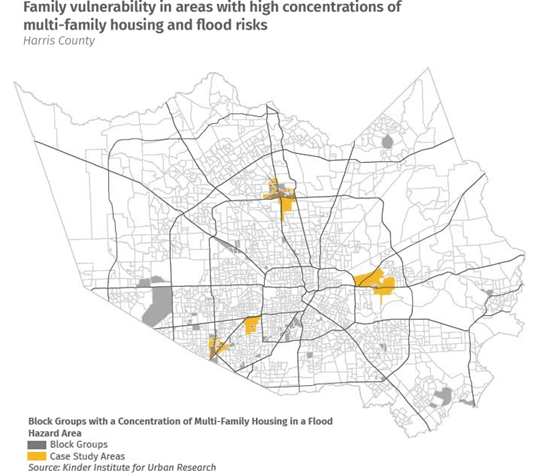Half a million people in the Houston region living in multi-family units are at risk of flooding
Compounding the challenge to both affordable housing and the families who depend on it, according to a new report by the Greater Houston Flood Mitigation Consortium
HOUSTON – March 21, 2019 – In the report Affordable Multi-Family Housing: Risks and Opportunities released today by the Greater Houston Flood Mitigation Consortium, Houston and Harris County face several challenges in the effort to provide safe, affordable multi-family housing for residents. There is no single solution, but new policy, regulations and programmatic approaches to increase housing supply for the region should be explored.
“This report highlights the housing vulnerability of many families in the region,” said Christof Spieler, consortium project manager and vice-president, Huitt-Zollars. “Further, the current challenge for lowincome families to find housing will only worsen if there are extensive buyouts of apartments without a corresponding strategy for new affordable housing units. Properties located in the floodway alone are the equivalent of a year of new multi-family construction in Harris County.”
According to the researchers from Community Design Resource Center atthe University of Houston, Rice University’s Kinder Institute for Urban Research,and Houston Local Initiatives Support Corporation, the region would benefit from an affordable housing needs assessment and a comprehensive affordable housing plan for both the City of Houston and Harris County to address the challenges identified in the report.
Key findings identified in the research report:

- Half a million people are at risk. A total of 165,793 of the multi-family units in Harris County are in a flood risk area. These units are home to over 475,000 people.
- There is a widening gap between the supply of and demand for affordable multi-family housing. Based on historic and projected demolition and construction, the Harris County region is falling behind on protecting and constructing new affordable housing, squeezing the most vulnerable of families even before another disaster hits
- Production lags demand. Between 1990 and 2017, an average of 7,946 new renter households were established in Harris County each year. Over the same time period, a net gain of only 6,112 multi-family homes in buildings with two or more units were recorded each year.
- There is a loss of supply. An average of 1,850 multi-family units built before 1990 are lost each year in Harris County through demolition. Moving forward, an additional 2,010 affordable multifamily units could be lost each year through expiring subsidies.
- Low public subsidy. In Harris County, 1 of every 17 families, or 6% of total households, receive housing assistance directly through a home in public housing, a housing choice voucher or other subsidies. By comparison, in the five counties comprising New York City, 1 of every 6 receive assistance and in Fulton County, GA (Atlanta), 1 of every 7.
- Reliance on private market for affordable housing. Private market multi-family units comprise more than 87% of Harris County’s multi-family housing supply, potentially creating less stability for existing affordable units. This rate is higher than New York City’s 76% and Fulton County’s 71%.
Vulnerable families. In Harris County, there are 140,318 renter families who made less than $20,000 per year in 2017, or 1 of every 11 households. This number is nearly twice the number of families who receive housing assistance.
Suggestions concentrate on three main areas: 1) preservation of affordable multi-family housing, 2) building new affordable multi-family housing and 3) protecting vulnerable families.
Proposals to preserve affordable multi-family housing:
- Establish a publicly-funded Housing Trust Fund for housing recovery.
- Focus on areas outside of the floodplain.
- Establish a privately-funded Housing Strike Fund to assist development and preservation. Proposals to build new affordable multi-family housing:
- Establish a program to redirect development away from flood-prone areas – a Transfer of Development Rights and bolster incentives for private affordable housing development outside of the floodplain.
- Expedite permitting and streamline inspections.
- Reduce parking requirements and consider flexible density/height requirements.
- Leverage local housing authorities’ tax-exempt status to initiate private projects with affordable units.
- Utilize the Houston Land Bank, Houston Community Land Trust, and Opportunity Zones to build new multi-family in low-risk areas.
Proposals to protect vulnerable families:
- Establish a local disaster-displacement rental assistance program.
- Require clear flood risk disclosures to renters and owners alike.
- Streamline inspections and permitting of multi-family to get units back online.
- Create a quick-buy program ensuring removal of vulnerable populations from the floodplain.
- Provide eviction protection programs.
Expand the Housing Choice Voucher program and protect holders from discrimination.
Eight study areas were identified based on concentrations of affordable multi-housing and the impact of Hurricane Harvey across the region. Four regions – Greenspoint, Gulfton, Northshore, and Westwood/Alief – were studied in depth.
A link to the report can be found at houstonconsortium.org.
About the Consortium:
The Greater Houston Flood Mitigation Consortium includes the Greater Houston area’s leading researchers focused on landscape-scale and neighborhood-level flood mitigation strategies that are feasible and have high potential for impact. Huitt-Zollars, a planning, engineering, and architectural firm, manages the consortium. The consortium is funded with support from Houston Endowment, KinderFoundation, and the Cynthia & George Mitchell Foundation with additional support from the WaltonFamily Foundation,Cullen Foundation, and Harte Charitable Foundation. More at houstonconsortium.org.
###
Media Contact:
Claudia Morlan, Elmore Public Relations claudia@elmorepr.com, 832-725-6884 (mobile)